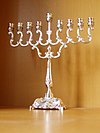Al HaNissim

The Prayer in a Siddur from the city of Fürth, 1738, from the collections of the National Library of Israel
The prayer as a part of the candle lighting blessing, Moorocan Jewish variant
Al HaNissim alternatively V'al HaNissim[1] ([ו]עַל הַנִסִּים, "[and] on the miracles") is an addition to the Amidah and Birkat Hamazon on Hanukkah and Purim. On both holidays, it starts off with a short paragraph, beginning with the words for which it is named. After that, each holiday has a unique paragraph, describing the events for which that day is celebrated.[2]
Text of the Prayer[]
The standard Ashkenazi Orthodox text of the prayer is as follows:
| Hebrew | English |
|---|---|
| On Hanukkah and Purim: | |
| וְ)עַל הַנִּסִּים וְעַל הַפֻּרְקָן וְעַל הַגְּבוּרוֹת וְעַל הַתְּשׁוּעוֹת וְעַל הַמִּלְחָמוֹת) | (And) for the miracles and for the redemption and for the mighty acts and for the salvation and for the wars |
| שֶׁעָשִֽׂיתָ לַאֲבוֹתֵֽינוּ בַּיָּמִים הָהֵם בִּזְּמַן הַזֶּה | that You have done for our forefathers in those days in this season. |
| On Hanukkah: | |
| בִּימֵי מַתִּתְיָֽהוּ בֶּן יוֹחָנָן כֹּהֵן גָּדוֹל חַשְׁמוֹנָאִי וּבָנָיו | In the days of Mattityahu son of Yochanan the High Priest the Hasmonean, and his sons, |
| כְּשֶׁעָמְדָה מַלְכוּת יָוָן הָרְשָׁעָה עַל־עַמְּךָ יִשְׂרָאֵל לְהַשְׁכִּיחָם תּוֹרָתֶֽךָ וּלְהַעֲבִירָם מֵחֻקֵּי רְצוֹנֶֽךָ | when the wicked Greek Kingdom rose up against Your nation Israel to make them forget Your Torah and to remove them from the laws of your will, |
| וְאַתָּה בְּרַחֲמֶֽיךָ הָרַבִּים עָמַֽדְתָּ לָהֶם בְּעֵת צָרָתָם | and You in Your great mercy stood up for them in their time of distress. |
| רַֽבְתָּ אֶת־רִיבָם דַּֽנְתָּ אֶת־דִּינָם נָקַֽמְתָּ אֶת־נִקְמָתָם | You fought their fight, judged their judgement, [and] avenged their revenge. |
| מָסַֽרְתָּ גִבּוֹרִים בְּיַד חַלָּשִׁים וְרַבִּים בְּיַד מְעַטִּים | You turned over the strong in the hand of the weak, and the many in the hand of the few, |
| וּטְמֵאִים בְּיַד טְהוֹרִים וּרְשָׁעִים בְּיַד צַדִּיקִים וְזֵדִים בְּיַד עוֹסְקֵי תוֹרָתֶֽךָ | and the impure in the hand of the pure, and the wicked in the hand of the righteous, and sinners in the hand of those involved with Your Torah. |
| וּלְךָ עָשִֽׂיתָ שֵׁם גָּדוֹל וְקָדוֹשׁ בְּעוֹלָמֶֽךָ | And for You, You made a great and holy name name in Your world, |
| וּלְעַמְּךָ יִשְׂרָאֵל עָשִֽׂיתָ תְּשׁוּעָה גְדוֹלָה וּפֻרְקָן כְּהַיּוֹם הַזֶּה | and for Your nation Israel you did a great salvation and redemption to this day. |
| וְאַחַר־כֵּן בָּֽאוּ בָנֶֽיךָ לִדְבִיר בֵּיתֶֽךָ | And after this Your children came to the Holy of Holies of Your House |
| וּפִנּוּ אֶת־הֵיכָלֶֽךָ וְטִהֲרוּ אֶת־מִקְדָּשֶֽׁךָ וְהִדְלִֽיקוּ נֵרוֹת בְּחַצְרוֹת קָדְשֶֽׁךָ | and cleaned your abode, and sanctified your sanctuary, and lit candles in the courtyards of your sanctuary, |
| וְקָבְעוּ שְׁמוֹנַת יְמֵי חֲנֻכָּה אֵֽלּוּ לְהוֹדוֹת וּלְהַלֵּל לְשִׁמְךָ הַגָּדוֹל | and established these eight days of Hanukkah to give thanks and praise to your great name. |
| On Purim: | |
| בִּימֵי מָרְדְּכַי וְאֶסְתֵּר בְּשׁוּשַׁן הַבִּירָה | In the days of Mordechai and Esther, in Shushan, the capital, |
| כְּשֶׁעָמַד עֲלֵיהֶם הָמָן הָרָשָׁע | when Haman, the wicked, rose up against them |
| בִּקֵּשׁ לְהַשְׁמִיד לַהֲרוֹג וּלְאַבֵּד אֶת־כָּל־הַיְּהוּדִים | and sought to destroy, to slay, and to exterminate all the Jews |
| מִנַּֽעַר וְעַד־זָקֵן טַף וְנָשִׁים | young and old, infants and women, |
| יוֹם אֶחָד בִּשְׁלוֹשָׁה עָשָׂר לְחֹֽדֶשׁ שְׁנֵים־עָשָׂר הוּא־חֹֽדֶשׁ אֲדָר | on the same day, on the thirteenth of the twelfth month, which is the month of Adar, |
| וּשְׁלָלָם לָבוֹז | and to plunder their possessions; |
| וְאַתָּה בְּרַחֲמֶֽיךָ הָרַבִּים הֵפַֽרְתָּ אֶת־עֲצָתוֹ וְקִלְקַֽלְתָּ אֶת־מַחֲשַׁבְתּוֹ | But You, in Your abundant mercy, nullified his counsel and frustrated his intention and caused his design to return upon his own head and they hanged him and his sons on the gallows.[3] |
Al HaNissim on Yom Ha'atzmaut[]
Various rabbis endorsed the recitation of Al Hanisim on Yom Ha'atzmaut, and even penned unique versions of this prayer, although this practice is not universally accepted. The first to publish a version of Al Hanisim for Yom Ha'atzmaut was Rabbi Ezra Zion Melamed.
References[]
- ^ Nulman, Macy. "Al Hanisim: Concerning the Miracles". myjewishlearning.com. Retrieved November 28, 2018.
- ^ "Festival and Holiday Liturgy:", The Canonization of the Synagogue Service, University of Notre Dame Press, pp. 115–126, 1979-11-30, ISBN 978-0-268-07665-8, retrieved 2021-02-25
- ^ ""Al HaNisim" Section for Purim". Jewish Holidays. 1970-01-01. Retrieved 2021-02-25.
Categories:
- Hanukkah
- Purim
- Hebrew words and phrases in Jewish prayers and blessings
